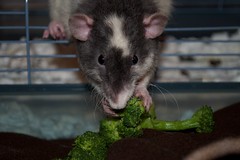I've been postponing a post on vat meat. Seems like every month or so I see something on making meat in a lab. These blurbs overflow with 'meat apologism' to sate bacon-loving hipsters and others who have guilt but just can't quit meat. I know many people miss meat to an amazing degree, but I've never really felt that. Maybe I miss convenience, but that's minor. So I have been thinking of a succinct reply to the issue of vat meat or in-vitro meat other than rolling my eyes. I don't think I've succeeded, so feel free to roll your eyes instead.
Here are the main issues concerned:
Food Security: This all depends on cost. Many of the above-linked articles mention this feed-the-world aspect, as do many pronouncements regarding new foodstuffs. I'll believe it when I see it.
Health: I see a marginal improvement here over factory farmed meat. I'm confident the level of cholesterol and fat can be modified to some extent. Yet I doubt the vat meat will catch up with an animal-free diet.
Sustainability: Will the resources going in to this be much more than what we get out? I think it can be more efficient to grow only a blob of muscle and not the bones, skin, hair, brain, and so on. However, it all depends on what and how much is fed to the vat meat to make it grow.
Woo: Woo is that irrationality that is always in play with such visceral and emotional choices. People really like the whole charade that is natural food. Some would rather smoke natural cigarettes than eat something sciency, even if the former is much more likely to kill them. The only way I see around this is to suppress labeling so a consumer does not know if the meat they bought came from a factory farm or not. This has certainly worked in the past, so it should work here as well.
Taste: It bugs me that this is a main issue. I don't think anyone likes the flavor meat with no additions or adulterations. Most omnivores char it, season it, and put it with other ingredients, burying the flavor of the meat. Then at the next meal, they eat something different. But that's beside the point. Theoretically the meat from the lab will taste the same as meat from the factory farm, though no one has tasted the progress so far. So take that entire lack of empirical evidence how you will.
Cost: That's the big issue. I don't hear much about companies doing this, only labs. This hints that the potential profits are low, if not negative. However, labs may be dabbling in this area as the technology is closely related to growing human organs in vitro and engineering meat (mostly muscle) should be easier than engineering a heart. But I'm not sure doing this in a lab/factory will be more cost efficient than a factory farm. Sure, they could engineer Kobe beef or some high-end stuff, but I'm not sure the people who like organic beef from cows massaged by hand will go for something from a factory.
Animal Cruelty: This is perhaps the biggest issue. There isn't much of a point otherwise, unless cost is less than rice and beans. After all, PETA's even offering one million dollars for the first to make in-vitro chicken within a year (guess they have a big barbeque next June). But as I mentioned previously, unless they dramatically change the technology, they will grow the cell cultures for the in-vitro meat in a bath of fetal bovine serum (FBS), fetal horse serum (FHS), or some other liquefied aborted animal. They do this because science does not know all the little chemicals that a cell or an organ needs to grow, so they just dump a soup on there that has more than enough. There exist some alternatives, but I'm not sure if these researchers are using any of them. Besides, is growing cells from an unborn calf cheaper and easier than growing the calf into a cow?
So when will this happen? According to many of the articles, it's always five years away, which means never. Though I think it actually will happen, just because the power of bacon and guilt is so strong. However, once it happens in a research lab, I don't see it going too far beyond a novelty.
Would any of you, vegan or otherwise, eat such a thing as test tube meat? What about test tube dairy? Test tube honey? Test tube long pig?
31 August 2011
29 August 2011
A Minor Perk of A Post-Animal-Testing World
I am a fan of molecular gastronomy, where cooks use scientific understanding and new technology to make better and more novel food. In a moment of half-baked entrepreneurial spirit, I wondered if the techniques for drug discovery could be applied to developing new flavorings. So in the same way that the side chain on the penicillin molecule is varied to create benzylpenicillin and phenoxymethylpenicillin, I wondered if one could take vanillin and modify it. I know there already exists ethylvanillin, but what about butylvanillin, pentylvanillin, or putting something crazier on there? I think the market for novel capsaicinoids would be immense, especially if one could boost the heat.
Those of you more into the wilds more than the lab, could use a chemical prospecting approach. There are more than 1,740,330 species of plants, animals, fungi, bacteria, and archaea, and humanity has yet to taste them all. Especially archaea, which to my knowledge none are eaten by humans intentionally. Some of the inedible/poisonous ones could still have interesting flavor compounds developed through evolutionary processes.
But I bumped into a hurdle that would be pretty big even without involving my ethics. Before putting a new chemical in food, it needs safety testing just like a drug would. I know many labs dread the whole FDA approval process, and that's for life-saving drugs and not frivolities like funny flavors. Personally, I do not think all those animal lives are worth it.
The science of toxicology is still very young, as evidenced by the century-old animal testing methods still in practice. But as I have brought to your attention on a few occasions, science is slowly progressing to cheaper, more accurate, and less cruel models of testing. As with other technological advancements like the Internet and plastics, many other advancements follow as a result. I think that with the advancement of animal-free tox testing one of the results will be more food options. Perhaps some new kind of algae, chytrid, or other wee thing we can grow in bulk.
In the long meantime before that day, we'll have to settle for self-testing with 'universal' edibilty tests or by desperation at times of famine. Of course, those of you that forage know that the number of edible plants, protists, and fungi far exceeds what is at the mega-mart. So you really have no excuse for not trying something new, and living part of the dream today.
Labels:
animal testing,
food,
foraging,
molecular gastronomy,
penicillin,
safety testing,
toxicology,
vanillin
Subscribe to:
Comments (Atom)







